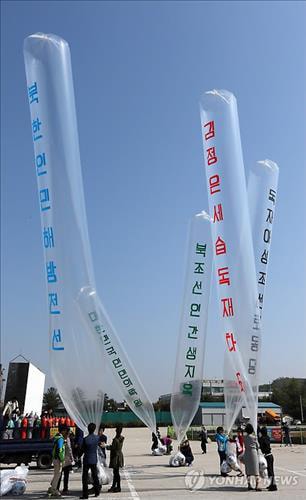Deadlock in inter-Korean relations
(Baonghean) - Recently, the Democratic People's Republic of Korea announced the cancellation of inter-Korean dialogue with the Republic of Korea because the Republic of Korea continued to send anti-Korean leaflets. For its part, the Republic of Korea issued a statement expressing regret over the decision of the Democratic People's Republic of Korea, while emphasizing that it will respond firmly to any provocative actions that endanger the Korean people. The current deadlock in inter-Korean relations has made the international community concerned about new tensions that may arise on the peninsula.
 |
| South Korean activists send anti-Pyongyang leaflets. |
| RELATED NEWS |
|---|
Early last month, relations between South Korea and the DPRK were considered positive when the Vice Chairman of the Central Military Commission of the DPRK led a high-ranking delegation to visit South Korea and attend the closing ceremony of the 17th Asian Games in Incheon, South Korea. At that time, public opinion expected open inter-Korean dialogues between the two sides to be held. Because before that, at the request of the South Korean side, the DPRK also agreed on October 4 to restart inter-Korean dialogues that had been stalled since last February. However, immediately after the visit of the high-ranking delegation of the DPRK to South Korea, the two countries' armies exchanged artillery fire in both the sea and land border areas. This incident once again strained relations between the two countries.
Not only that, the inter-Korean meeting scheduled for October 30 did not take place as previously agreed between the two sides because the DPRK suddenly canceled it because the South Korean side had continuously sent leaflets against the country. The incident of South Korean civil activists launching leaflets by balloon across the border into the DPRK was considered by Pyongyang as an act of bad faith, although the South Korean side denied that this incident was related to the Government. Meanwhile, the South Korean news agency KBS quoted a South Korean official as saying that the DPRK had just launched a new submarine capable of firing ballistic missiles.
It can be seen that the relationship between South Korea and the DPRK is a complicated one, sometimes calm, sometimes tense, because there are many conflicts between the two sides that are not easy to reconcile, and most importantly, there is still not much trust in each other. The DPRK often strongly opposes South Korea's joint military exercises with the US and considers this a threat to its national security. Meanwhile, South Korea is also concerned about the DPRK's continuous missile launches, a move that always forces Seoul to increase its defenses. The recent cancellation of the inter-Korean meeting could lead to a deadlock in the opportunity to improve relations between South Korea and the DPRK, along with a series of stalled bilateral exchanges. And clearly, the international community has grounds to worry that tensions may escalate on the Korean peninsula in the near future.
Nguyen Cao Bien
